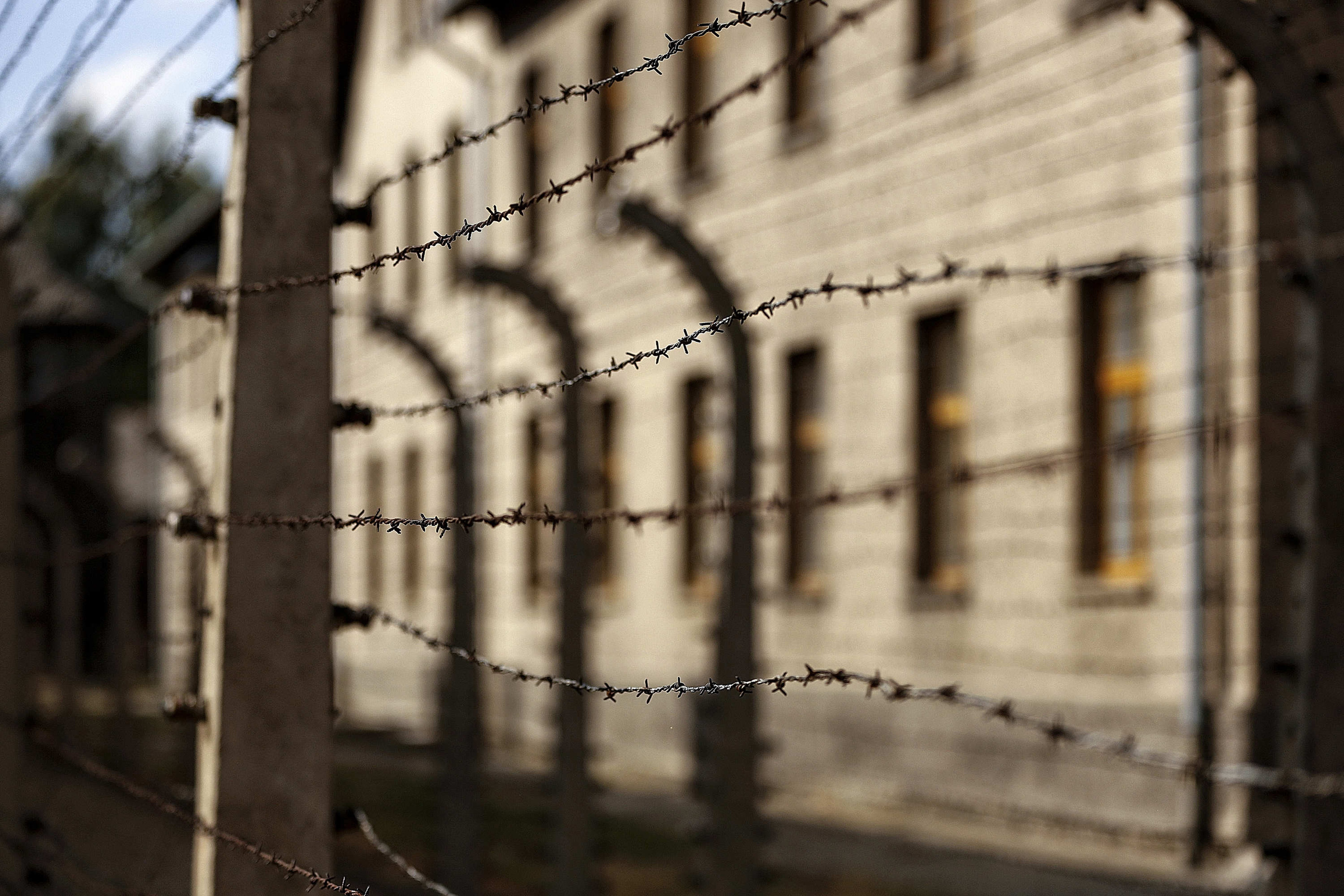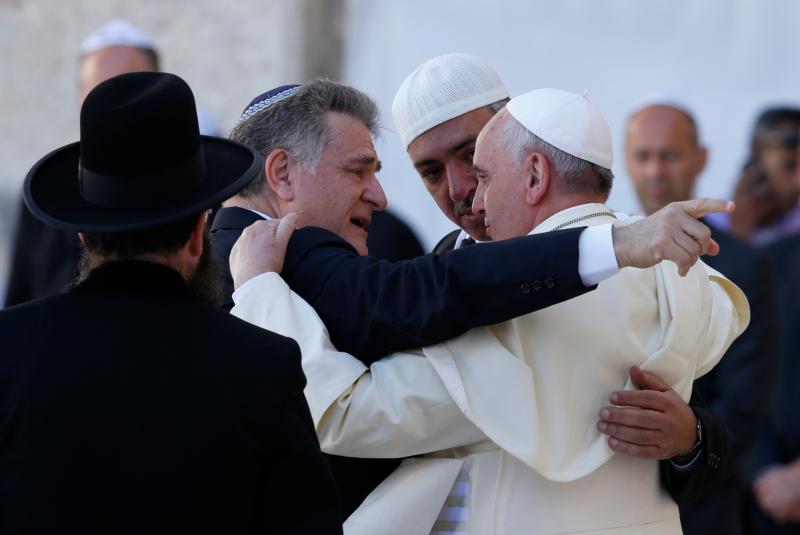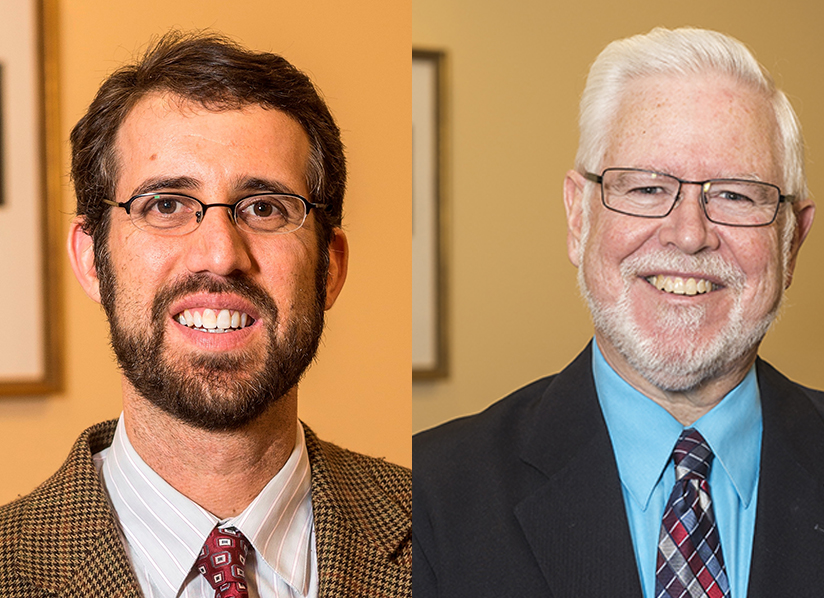
Lines of barbed-wire fencing enclose the Auschwitz-Birkenau Nazi death camp in Oswiecim, Poland, in this Sept. 4, 2015, file photo. (CNS photo/Nancy Wiechec)
On the 75th anniversary of the liberation of Auschwitz, scholars at St. Joseph’s University in Philadelphia are stressing that more needs to be done to end antisemitism — and to prevent the systematic murder of 6 million Jews from being forgotten.
(Related: Remembering the Holocaust is ‘a duty,’ Pope says)
“The story must be presented in its details, together with why it is important to remember it,” said Rabbi Abraham Skorka, a visiting academic at the university’s Institute for Jewish-Catholic Relations (IJCR) and a close collaborator with fellow Argentinian native Pope Francis. Founded in 1967, the IJCR is the oldest university center of its kind in the U.S. created in response to the Second Vatican Council’s call for increased interfaith dialogue.
[hotblock]
Located some 40 miles outside of Krakow, Poland, the Auschwitz (or Auschwitz-Birkenau) complex was the largest of the Nazi regime’s network of concentration camps, through which German chancellor Adolf Hitler sought to eliminate the Jewish population.
Building on European antisemitism during the 1920s and 1930s, Hitler’s “Final Solution” campaign was formally implemented after a January 1942 conference, where Third Reich officials – frustrated by the slow pace of firing squad executions – agreed upon large-scale methods for the rapid extermination of Jews.
At least 1.1 million people were murdered at the Auschwitz complex: the vast majority were Jews (about 960,000) along with 70,000 Poles, 25,000 Sinti and Roma (derogatively called “Gypsies”) and some 15,000 prisoners of war. Most were killed through exposure to hydrogen cyanide gas, with their bodies burned in a number of on-site ovens. Prior to their executions, many had also been subjected to medical experimentation and forced sterilization.

Rabbi Abraham Skorka, visiting scholar at St. Joseph’s University’s Institute for Jewish-Catholic Relations, embraces fellow Argentine and longtime friend Pope Francis, along with Sheik Omar Abboud, at Jerusalem’s Western Wall, May 26, 2014. Reflecting on the 75th anniversary of the liberation of Auschwitz, Rabbi Skorka said that to prevent future genocides it is vital “not to be indifferent to the aggression that others receive.”(CNS photo/Paul Haring)
On Jan. 27, 1945, the Auschwitz camp was liberated by Soviet forces, who rescued approximately 7,000 remaining prisoners left behind by Nazi guards.
A total of some 6 million Jews, 200,000 to 500,000 Roma and Sinti, and thousands with mental and physical disabilities were killed in the concentration camps.
Dissidents, political prisoners and individuals with same-sex attraction were also persecuted.
Professor and IJCR director Philip Cunningham said that in the centuries prior to the Second World War, European Jews had long been marginalized by “Christian anti-Jewish teachings over the centuries, most especially that Jews were cursed by God for the crucifixion or rejection of Jesus.”
As a result, the Jews became “a vulnerable minority that could be scapegoated in times of crisis,” he said.
A 1998 Vatican document stated that Hitler’s ability to perpetrate such genocide in “countries of long-standing Christian civilization” called into question “the relation between the Nazi persecution and the attitudes down the centuries of Christians towards Jews.”
In its declaration “Nostra Aetate,” the Second Vatican Council denounced attempts to blame Christ’s passion on “all the Jews, without distinction, then alive … or the Jews of today.”
Cunningham noted that as part of its response, the Vatican refers to the Nazi genocide by the preferred Hebrew term “Shoah,” which signifies a devastating whirlwind, while “holocaust” refers to a sacrifice offered to God.
Both Cunningham and IJCR co-director Professor Adam Gregerman say that they are encouraged that many of their students have studied the Shoah in high school – although usually without exploring the deeper causes of the genocide.
“I suspect few were exposed to painful and difficult issues about how the history of Christian anti-Judaism might relate to Nazi antisemitism, judging by their knowledge of the theological issues raised by the Shoah,” said Gregerman.

Professors Adam Gregerman and Philip Cunningham, directors of the Institute for Jewish-Catholic Relations at St. Joseph’s University, say that they are encouraged their students have studied the Shoah (the preferred Hebrew term for the Holocaust), but that the deeper causes of the genocide must still be examined. (CatholicPhilly.com composite photo / Courtesy of St. Joseph’s University)
Current events have provided an alarming reminder of how the past can quickly become the present, said Cunningham.
Deadly attacks on Jews, Muslims, Sikhs and Christians of minority ethnicities have taken place in recent years in the United States. In addition, he said, “we regularly witness in the media people being verbally demeaned and mocked, sometimes by our national leaders.”
Noting that “there is a vast gulf between verbal insults and murder,” Cunningham cautioned that history demonstrates a “slippery slope” from “negative speech to social avoidance, civil and legal discrimination, physical attacks and ultimately genocide.”
Gregerman also observed that “earlier racially or theologically based hostility to Jews does not reappear in identical forms.”
It is difficult to predict if a future genocide is possible, said Rabbi Skorka, who said that the real question is “to ask whether everything necessary is being done to prevent it.”
Above all, awareness and action are essential in healing the wounds of antisemitism, he said.
“Do not be indifferent to the aggression that others receive,” said Rabbi Skorka. “Do not be silent; shout out loud in the face of prejudice and violence because present in your cries will also be the voice of God.”
PREVIOUS: Philly’s ‘in great hands’ with Archbishop Perez, say parishioners
NEXT: Archbishop Chaput speaks with young adults in West Chester


Share this story